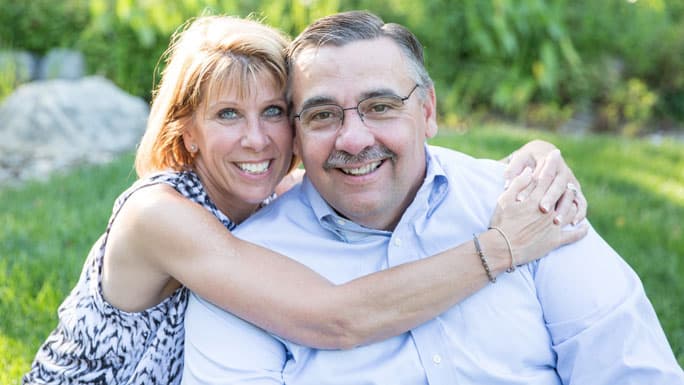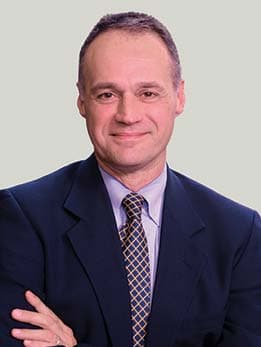The CAR T-cell Chicago story: One year later

"It was like seeing your first child being born," said Michael Bishop, MD. "I was at the bedside, watching those cells go in, several million modified lymphocytes from just this little package. To see them flow in is exciting, even amazing. Then, suddenly, it's over. My first thought was: Is that it? That's all it takes, that little amount of cells?"
It was Wednesday, May 18, 2016. Bishop, professor of medicine and director of the Hematopoietic Cellular Therapy Program at the University of Chicago Medicine, was carefully observing, along with about a dozen members of his team, the first chimeric antigen receptor T-cell (CAR T) infusion, a newer form of immunotherapy, at the University of Chicago Medicine.
The process began around 9:30 a.m. Just after 10, the cells arrived, in a metal cooler packed with liquid nitrogen. The cell processing lab technician removed the small packet of frozen cells and gently began to thaw them.
This is going to change how we treat hematologic malignancies.
Also watching intently was patient 1, Scott McIntyre, 53, from South Bend, Ind., a lifelong Notre Dame fan. He had waited a long time for this.
McIntyre was diagnosed with diffuse large B-cell lymphoma (DLBCL), stage 3, in November 2013, but he had probably been sick for a few months before that. In September 2013, he developed a swollen lymph node in his right groin area. A second scan in November revealed one swollen node in his neck and another under his arm. A few days later, Thomas Reid, MD, an oncologist based in South Bend, confirmed the lymphoma diagnosis.
The standard treatment for stage-3 DLBCL is a chemotherapy regimen including a monoclonal antibody; three chemotherapy agents and a steroid - many drugs, with multiple side effects. McIntyre made it smoothly through the first few cycles. Then he developed appendicitis, delaying his fourth round. After all of that, his remission lasted two months.
In 2014, Reed referred him to a trusted colleague, Sonali Smith, MD, the Elwood V. Jensen Professor in Medicine and director of the lymphoma program at UChicago Medicine.
"They work together," McIntyre explained. "If it can be done in South Bend, she supports it. If she thinks it needs to be done at the University, she makes that happen. They are always on the same page."
"By the way," he added, "she's fantastic. We trust her. We've constantly been on her radar. She always has a plan."
At that time, CAR T-cell therapy was being investigated in a few select centers. The short-term goal for McIntyre's team was to control his cancer, make him as healthy as possible, and keep him alive. In February 2015, McIntyre had a stem cell transplant. He was in remission but, again, only for a few months. Then his cancer came back. Two more clinical trials and some precisely targeted radiation therapy bought a little more time, but by late 2015 his lymphoma was gaining on him.
Then three good things happened.
Although McIntyre had season tickets for his beloved Notre Dame football team, he missed every game in 2015. So, his wife and his best friend bought him tickets and flew him to Arizona to watch the Fiesta Bowl on Jan. 1, 2016. Ohio State beat Notre Dame, but at least he was there to watch it.
At the end of January 2016, the McIntyres' oldest son married his longtime fiance. They had been trying for a years, McIntyre said, "but they couldn't, because I kept getting so sick." This time, he managed to stay well, take classes to become an ordained minister, and officiate at the wedding.
In early February, McIntyre's medical team got the go-ahead for CAR T-cell treatment and began harvesting his T cells as part of a clinical trial (results of which were released on Dec. 1, 2018). They took out blood, extracted the lymphocytes and returned everything else. They put the collected cells on ice. Then they waited.
There are only a few centers in the United States that are certified to convert a patient's T cells into chimeric antigen receptor T cells, a potent anti-cancer weapon. Because each batch is designed for a different patient, they must be produced one at a time. It takes about three weeks to prepare a patient's cells.
These modified T cells search out specific cells - in this case, those that display a surface protein called CD19, which is found on cancerous B cells. When the modified T cells detect and connect with these dysfunctional cancer cells, they annihilate them.
The process has proved remarkably effective. In 80 to 90 percent of cases, patients with acute lymphoblastic leukemia get a complete remission. About 40 to 50 percent of patients with McIntyre's disease, diffuse large B-cell lymphoma, have complete lasting remissions.
"In patients, such as Scott, whose disease was completely refractory, 40 to 50 percent success is remarkable," Bishop said. "These tend to be durable."
About 40 to 50 percent of patients with McIntyre's disease, diffuse large B-cell lymphoma, have complete lasting remissions.
McIntyre had to wait a few months for his turn. On April 12, 2016, the Swiss pharmaceutical company Novartis, who had partnered with the University of Pennsylvania - one of the pioneers of this technology, to bring this technology to the clinic - asked the Chicago team to send them his cells. A few weeks later the modified cells came back and the infusion was set for May 18.
"This is scary," McIntyre said, a few days before his infusion, "but exciting."
By this time, he had already surprised his care team a few times. When cancer comes back after a stem cell transplant, for example, life expectancy is about six months. "I beat the odds," he said. "I made it over a year. Now we're talking about a cure. I'll take it."
The therapy is not without risks. Once the T cells enter the patient's body, each one multiplies rapidly, producing thousands of offspring. Then they launch a vigorous assault. This activity, the rapid destruction of a large volume of cancerous cells, can cause severe flu-like symptoms: fevers, swelling, low blood pressure. It sometimes causes neurologic effects such as delirium. McIntyre experienced this, briefly, but a short course of steroids quickly brought his immune system back in line.
Patients who have a complete response, meaning no evidence of disease, for three months or more, are unlikely to have a recurrence. McIntyre is now more than a year out from treatment, with no sign of any remaining cancer.
"This is going to change how we treat hematologic malignancies," Bishop said.
"Right now, we use this for the sickest patients, those with refractory disease. But it could become standard therapy, with significantly improved prognosis," he added. "This is just the infancy of this approach."

CAR T-Cell Therapy
CAR T-cell therapy supercharges a patient's white blood cells to find and destroy cancer cells. UChicago Medicine research played a key role in the development of this exciting new immunotherapy.
View videos and learn more
Michael R. Bishop, MD
Michael R. Bishop, MD, specializes in the diagnosis and treatment of lymphomas and leukemias. He is an expert in stem cell transplantation and cellular therapy, including CAR T-cell therapy, an advanced form of immunotherapy.
Learn more about Dr. Bishop